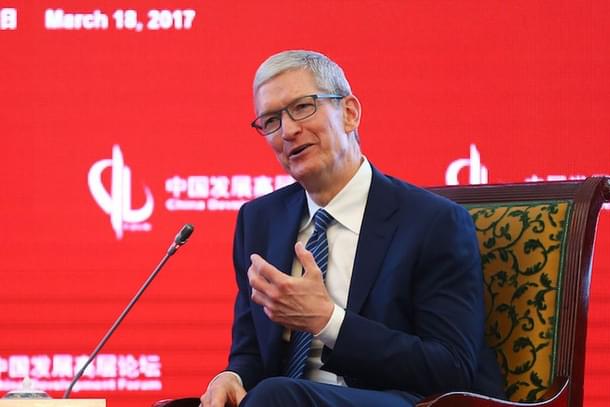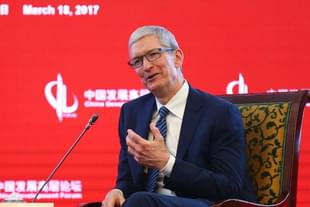World
Taiwan Crisis: How US Companies Toe The Chinese Line
Tushar Gupta
Aug 08, 2022, 04:55 PM | Updated 04:51 PM IST
Save & read from anywhere!
Bookmark stories for easy access on any device or the Swarajya app.


In its continued response to the visit of Nancy Pelosi, the Speaker of the United States House of Representatives, Beijing is now aggressively employing its trade leverage against Taipei to intensify the prevailing supply chain crisis. It was reported that shipments to China from Pegatron, one of the Taiwanese electronics manufacturers, were delayed.
According to reports that the company later denied, the boxes were held at Chinese customs for label examination. The authorities wanted to ensure that the words ‘Taiwan’ or 'Republic of China' were not used on the boxes.
The long-standing rule, now being enforced by the Chinese government more strictly, is that all the components and parts that are exported from Taiwan must be labelled as ‘Made In Taiwan, China’ or ‘Made in Chinese Taipei’ to ensure no hold-up at customs and consequently no delays in shipments. China is Taiwan’s biggest trading partner.
In 2020, Taiwan’s exports to China were around $100 billion, while the imports were worth $60-odd billion. Twenty-five per cent of Taiwan’s trade is with China. Integrated circuits make up most of Taiwanese exports, more than one-third, and for companies with manufacturing hubs in China, this is a critical part of the supply chain.
Thus, it was no surprise that Apple quickly warned its suppliers to follow the Chinese labelling rules, given most of the company’s manufacturing happens in China. Relying on the country for around 18 per cent of its revenue, the company was quick to toe the line to ensure minimal disruption of components and other key shipments, weeks ahead of its annual launch of new iPhones and other products. Pegatron is one of the suppliers for Apple’s production hubs in China, and a disruption in the supply chain could have wrecked the company’s plans for the September releases.
However, Apple’s appeasement of China has a decade-long history. Apart from taking the company to a $3 trillion valuation, one of Tim Cook's achievements has been how he has dealt with China. From investments to apologies, Cook has done everything to be on the right side of Beijing and President Xi Jinping.
In 2013, Cook apologised to the Chinese customers for Apple’s one-year warranty policy against the two years mandated under Chinese law. After being criticised on a Chinese news network on International Consumers’ Day on 15 March 2013, Cook assured better service for the customers in China less than two weeks later.
In 2019, Apple, to prove its loyalty to Beijing during the Hong Kong protests, removed an app from its virtual store that allowed protesters to monitor police activity. Citing concerns about the safety of the residents and law enforcement officers, Apple quickly pulled down the app after a Chinese newspaper criticised the company for betraying communist sentiments.
In June 2021, reports surfaced about Apple’s ‘Goldengate’ Project. As per an investigation by The New York Times, Apple was storing the personal data of its Chinese customers using a state-owned server company in Guiyang. The report stated that the company had abandoned its encryption technology, employed across the globe after protests from the Chinese government, and employees were managing the data centres on the payroll of Beijing, thus raising concerns against data privacy and integrity. The encryption keys for the data of Chinese consumers were allegedly shared with Guizhou-Cloud Big Data, or GCBD, a state-owned company.
In late 2021, Apple’s $275 billion investment in China made the news. In 2016, to contain the political fallout in China, Apple pledged to help Chinese manufacturers develop advanced production technologies and cultivation of Chinese talent. The deal also stressed sourcing more components from Chinese suppliers, increasing the deal size with Chinese software firms, and further investments in Chinese companies. Apple, in return, was allowed to release iPhones in China with pre-installed and undeletable apps, as per reports. In hindsight, the deal served Apple well during President Donald Trump’s trade war against China.
The reality of Apple is the reality of several companies from the West that toe the Chinese line to retain their access to the world’s second-largest economy and biggest market of 1.4 billion people.
In June 2019, US athletic apparel and footwear giant Nike had to withdraw some of its sneaker offerings from China. The sneakers had been designed by Nike in collaboration with a Japanese streetwear fashion label, ‘Undercover’, headed by designer Jun Takahashi. In the same month, Undercover showcased its support for the pro-democracy protesters in Hong Kong through an Instagram story stating ‘No Extradition to China’ and ‘Go Hong Kong’, and, therefore, the withdrawal was necessary. Also, 26 per cent of Nike’s footwear and apparel were produced in China in 2018. Thus, the brand was unwilling to risk cheap labour and a thriving market.
In 2018, the fashion label ‘Gap’ apologised for one of their T-shirts that had a China map but without Taiwan as its part. Gap apologised and agreed to withdraw the T-shirt from the Chinese market. The companies apologising for upsetting the Chinese Communist Party in the past include Air Canada, US’ Delta Airlines, and Marriott. In Marriott’s case, the company’s websites and apps were blocked for a week until it apologised and announced that it had decided to show Taiwan as part of China. Dolce and Gabbana, Union Bank of Switzerland, Zara, and Mercedes-Benz, among others, have also apologised for not towing the Chinese line.
In March 2017, several companies in China decided to boycott South Korea’s Lotte Group, one of South Korea’s major retail operators in China. This happened because the company had agreed to provide land to host the Terminal High-Altitude Area Defence System (THAAD) in South Korea. While the THAAD installation was a preventive measure against North Korea, China saw it as a national security threat, and thus, consequences followed.
China was critical to the operations of Cathay Pacific, Hong Kong’s iconic airline. And when its employees were seen participating alongside the pro-democracy protesters in Hong Kong, China used this leverage and forced the airline to take action. Following the Cathay fiasco, KPMG and PwC issued directives to their employees against participating in the Hong Kong protests, like Apple warned its suppliers after Pelosi’s visit. Simply put, the leaders of the West may promise military intervention in Taiwan, but Wall Street and other companies of the West are in no position to risk their access to what they refer to as Greater China.
The defensive posturing and political prostrating before Beijing are a natural extension of the pro-China lobbying by the Wall Street giants in the White House. During the peak of the trade war, the White House trade adviser, Peter Navarro, called the Wall Street giants unregistered foreign agents of the CCP, running their shuttle diplomacy and accusing them of pressurising the Trump government to sanction waivers for China. Across the 2010s, Wall Street pumped money into Chinese companies, risking pension funds and all that when many of these Chinese companies had opaque financial records and questionable paperwork.
For the White House, the challenge is not in the Pacific alone, when it comes to Taiwan, but also from the Wall Street. With the CHIPS and Science Act setting aside $50-odd billion for the semiconductor industry within the US, Wall Street would want to prioritise supply chains over diplomatic posturing.
On the issue of Taiwan, America's economic engines and the White House are not on the same page, not even remotely.
This is the third piece of a four-part series. Read first part here and the second here.
Tushar is a senior-sub-editor at Swarajya. He tweets at @Tushar15_





